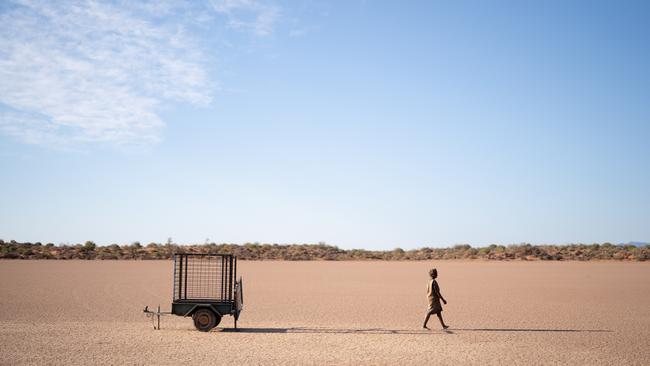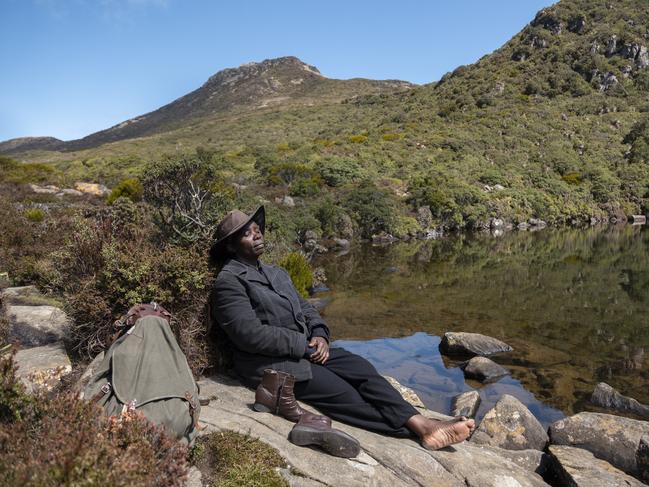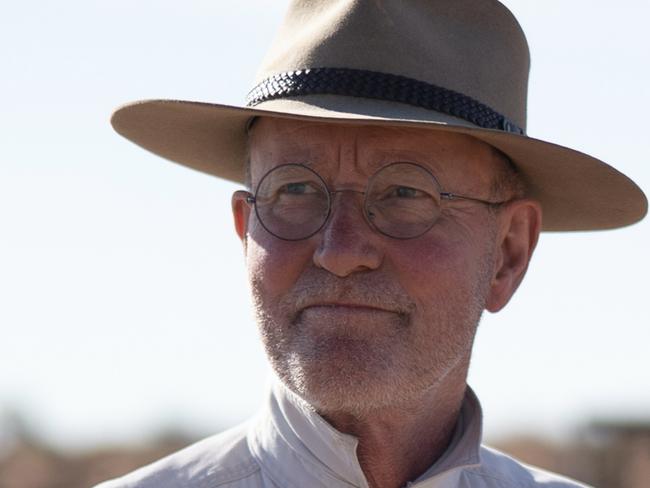Director Rolf de Heer discusses his new film The Survival of Kindness
First-time actor Mwajemi Hussein stars in Rolf de Heer’s haunting film about race, fear and contagion.

Director Rolf de Heer is known for his innovative and often unconventional films. But even seasoned cinephiles were surprised when his new film, The Survival of Kindness, opened at the Berlin International Film Festival in March, after its premiere in Adelaide.
The central performance is by a Congolese-Australian newcomer, Mwajemi Hussein, who before meeting de Heer had not set foot in a cinema, let alone appeared on camera.
She plays a character called, simply, BlackWoman. We first see her in the desert, locked in a cage from which she escapes, and who then travels across the country. The land she passes through could almost be anywhere – the film was actually made in South Australia and Tasmania – and it’s ravaged by a pandemic. Oxygen-mask-wearing officials are on her tail.
“Mwajemi is unbelievable,” de Heer says. “Unbelievable.”
The Survival of Kindness, he says, is an allegory of the time we live in and also a product of it.
“The film happened during the collision of Black Lives Matter and the pandemic and that collision was very evident, also in Australia, where there was a need for protest, but protest was banned because of Covid,” he says.
“I had an anger about the number of authority figures around the world who found Covid unimportant, because it largely kills poor or coloured people. I read a quote about that and it’s unbelievable. How can we still tolerate that?”
Hussein, who has six children, was working as a social worker in Adelaide and had no previous acting experience. Naturally outgoing, she recalls that members of her community group heard about auditions for the film and encouraged her to apply.
Even when she was cast, she was unsure about going ahead with the film, but her husband encouraged her, saying, “Rolf knows what he is looking for”. She also remembered her late father’s words.
“My dad used to say, ‘Never quit, because if you quit, you will never get to the second level’.” She discovered that de Heer was a caring person, like her father.
Before arriving in Australia on a refugee visa, Hussein had already been a refugee in Tanzania for eight years after fleeing the 1996 war in the DR Congo.
She says she knew all about the walking that her character does in The Survival of Kindness, because she and her family had walked for six months to reach the refugee camp in Tanzania. Often, they walked without shoes.
“I come from a very poor family and that was a part of my life,” she recalls. “I understand when people think it’s difficult, but when you don’t have a choice, you have to twist your brain somehow to accept the situation. BlackWoman is very courageous. She just keeps going.”
Racism is at the core of the film, but it isn’t specific to Australia.

“It’s everywhere,” Hussein says. “Even in my country, I was experiencing similar things. I left my village when I was 13 years old as there was a conflict between the two tribes. They were about to kill me and when they couldn’t find me, they killed my dad.”
De Heer says he believes racism is part of human psychology.
“Racism is one of those things that I think about a fair bit,” he says. “All human beings are hardwired to be racist; we are genetically programmed to find danger in the other. It’s like an almost insurmountable issue. People could say the Japanese people are racist and the Chinese are racist. Well, they are; the Indians, too. Of course, they are within their culture and exterior to their culture.
“We’re all racist because that’s how humanity has arisen through this very cautious attitude towards anybody coming from the outside, because they represent a danger.”
Born in The Netherlands, de Heer, 71, came to Australia with his family when he was eight. He is best known for Bad Boy Bubby and for his award-winning films with David Gulpilil, The Tracker (2002), Ten Canoes (2006) and Charlie’s Country (2013). He also made the only film to feature jazz legend Miles Davis as an actor, 1991’s Dingo.
For The Survival of Kindness, he originally had wanted to cast Peter Djiggir, a Djinba man who played Black Pete in Charlie’s Country and also appeared in Ten Canoes.
Djiggir has also co-produced documentaries directed by de Heer’s partner, Molly Reynolds, most recently My Name is Gulpilil, which de Heer co-wrote. It was released six months before Gulpilil’s death, in November 2021.

When Djiggir became unavailable because of “complicated health stuff”, the director had to find a new leading actor for his demanding film, which is almost entirely free of dialogue. He ultimately cast Hussein.
“There are not many black actors in Australia and it was almost better without it being an Aboriginal person, because the story is meant to be universal,” de Heer says. He also thought that having a woman at the centre “could be interesting” and Hussein – who is a force of nature – exceeded his expectations. De Heer likes to make smaller cinematic films in Australia. He tried his hand at Hollywood and it proved too difficult.
He recalls that, after his 1988 sci-fi film Encounter at Raven’s Gate, Hollywood had come calling very seriously.
“I wanted to make Dingo, and I did, and the experience I had on that film stopped any ideas I had in having a career trajectory there,” he says. “I was not interested at all in Hollywood any more.
“I’d been over there a fair bit and it was just not who I am.
“I didn’t want to make films on their terms. After Dingo, I thought that I needed to do it differently, because Dingo was a very difficult film to make.
“It cost friendships, people crashed cars and got injured and were damaged for life. I ended up being far more broke at the end of it than I was at the beginning.”
He then made Bad Boy Bubby which is now an Australian classic.

He says: “It was the first film I made thinking, ‘OK, I’m going to care about what I make. I want to make things that I like, because this career business is bullshit. And I’m going to care about the process of making the film, because making the film is me living my life’.”
He says he got on very well with Davis when they were making Dingo, and they had a lot of respect for each other.
“But by accident, he completely respected me because he thought I could read music faster than him, which was a mistake,” he says. “He looked up at me in wonder and said, ‘F--k man, you know everything’. It was just me trying to cope with how to deal with Miles and he was fantastic. His manager said, ‘Never, ever in my eight years with him has he been this co-operative to anybody’. We were in fact talking about doing another film, but then he died.”
Of course, de Heer’s greatest collaborator was Gulpilil, who was also reclusive and difficult to know. De Heer recalls how they bonded before going on to make their award-winning films.
“Before The Tracker, I spent a lucky week with David on his country,” de Heer says of his time among the Yolngu people in Arnhem Land.
“It was important that we shared experiences on his terms, that they were his culture’s experiences and I could be obedient to that. Afterwards, he had nothing but the highest respect, despite my reluctance to get tangled up in Indigenous kinship systems.
“He understood that too, but I was his older brother and that was it for him. There was nothing I could do about it. The Tracker is such an immaculate film and it was David who made it immaculate.”
De Heer says his job as a writer-director is to understand a range of people and the backgrounds they come from, including Indigenous Australians.
“On that level, I think I’m as qualified as anybody is,” he says.
“I guess I’ve spent a lot of time and energy working in the Australian Indigenous community. And I’ve learned to understand a great deal from that and have been invited back numbers of times to make films with them.
“This film is not so different. It’s different, but then every film is. In the end, the story is as much a white story as it is a black story.”
The Survival of Kindness opens in cinemas on Thursday.

To join the conversation, please log in. Don't have an account? Register
Join the conversation, you are commenting as Logout